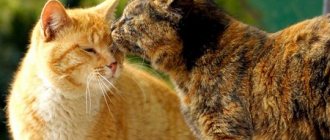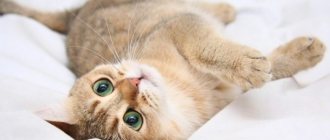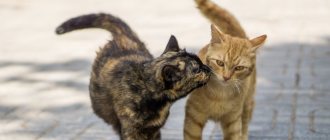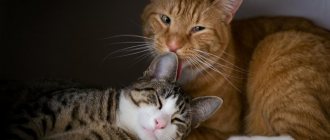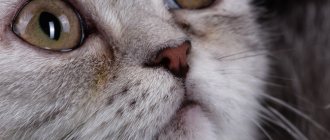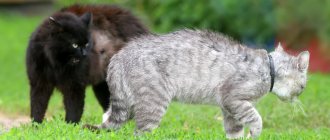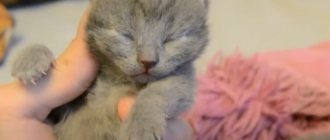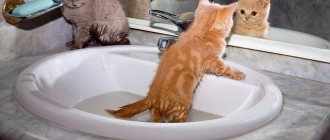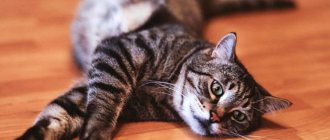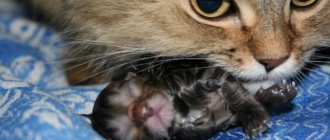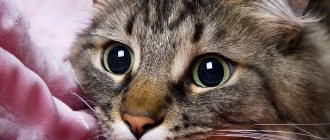Frequency and duration of estrus
There are no exact dates for the onset of estrus in cats. The approximate period is from 7 months to 1.5 years. If a cat begins to “leak” earlier and does not “leak” by the age of one and a half years, then this is a reason to consult a veterinarian.
The onset of estrus indicates that the cat is ready for fertilization and at this time she is actively looking for a partner. However, experts do not recommend mating her with a cat in the first six months after the start of estrus. If the cat does not become pregnant, it goes into heat approximately every two weeks. Each heat lasts on average from 5 to 10 days. If a pet’s love suffering lasts for 12-14 days or more, this is also a reason to contact a veterinarian.
Sexual activity reaches its maximum in late winter and early spring. But there is no direct connection between the period of sexual desire and the time of year in cats. Besides February-March, a cat may want a cat as soon as the production of the hormone progesterone in her body reaches a certain level. On average, estrus occurs 3-4 times a year. Their frequency depends on whether the cat has given birth, the age and breed of the animal. Less temperamental breeds, due to hormonal characteristics, “walk” less often. If a cat is regularly bred, then the sexual appetite is not so pronounced - estrus 2-3 times a year. Age also matters - the older the pet, the faster the heat ends and the less often it happens.
Causes of nocturnal activity in cats
Many cat owners have, in one way or another, experienced the night runs of their tailed pets. Among purring lovers, they even came up with a designation for this behavior, calling it “night tygydyk.” So what prompts a cat to run around at night, accompanied by loud meowing and the stomping of cat paws in the silence of a sleepy apartment? The specialists of the Murkosha shelter decided to look into this matter, which causes inconvenience for most cat owners, and tried to answer the question as fully as possible “what is the cause of nocturnal activity in cats and are there ways to correct this behavior?”
1) The apartment falls asleep, the cat wakes up
2) The main reasons why a cat is awake at night
3) How to eliminate the lack of daily activity
4) What to do in case of a hormonal peak
5) Medical problems
The apartment falls asleep, the cat wakes up
A familiar situation, isn't it? In order to better understand why this happens, let's go back a little to the behavior of the wild ancestors of our modern furry pets. The ancient ancestor of domestic cats, the African wildcat Felis silvestris libyca, is nocturnal. Hence the habits. In addition, do not forget that a cat is a natural predator and has excellent vision at night. Even after years of evolution, which have allowed modern cats to more or less adapt to the human biorhythm, their main activity still occurs from 20:00 in the evening to 05:00 in the morning. These watches are considered the most successful for hunting.
More information about the domestication of cats: https://murkosha.ru/nashi-stati/interesnoe-o-koshkakh/koshka-kotoraya-do-sikh-por-gulyaet-sama-po-sebe-istoriya-odomashnivaniya-koshek
And even though in a modern apartment at night there seems to be no one for a cat to hunt, instinct still demands its due. But in the daytime, mustachioed hunters prefer to rest. Sometimes a pet’s sleep during the day can last up to 7-8 hours, and in a day a mustachioed troublemaker can sleep through all 16. But still, in most cases, periods of long slumber alternate with short bursts of activity. That is, a cat can sleep for, say, 3 hours, and then suddenly jump up and develop vigorous activity, including jumping and hunting techniques to catch your legs.
But do not be mistaken that at night the cat only hunts, not at all. At night, she can do a bunch of other interesting and useful things for her. At night, the kitten may well go crunch on some tasty food if you left a bowl filled with treats for him, or walk around his property to make sure that no one has encroached on the entrusted territory. Even just sitting on the windowsill and looking at the city at night - what’s not to do?
In other words, nocturnal activity is a normal side of cat life and absolutely normal behavior for cats, especially in young animals. But since we humans still need to get enough sleep, animal psychologists have long identified the main reasons for this behavior and even developed ways to correct it.
The main reasons why a cat is awake at night
Instincts are, of course, an argument, but still the reasons why a cat is active at night can be different. The specialists of the Murkosha shelter, guided by many years of experience, have identified the main ones. After all, understanding what underlies your pet’s behavior in your particular case, it is much easier to choose methods that will allow you to correct night walks that are accompanied by loud meowing.
- Lack of daily activity and boredom
The most common reason that forces a kitten not to sleep at night. Pets that are left to their own devices during the day get plenty of sleep and accumulate enough strength for nighttime exploits. This can be facilitated by both your daily work schedule and, as a result, a cat waiting for you at home, bored and alone, and, conversely, noisy daytime companies, for example, a team of loud and active children, whose games encourage the purr to hide in a far corner and, again well, sleep. It is in this case that all hunting intentions, and simply vital cat matters, are guaranteed to be postponed to the night. After all, during the day your pet has exceeded the standard for rest, got bored, so by night she is full of energy for achievements.
- Hormonal peak in unsterilized animals
The owners of such pets also encounter “night tygydyk,” but in this case, an equally loud meow is added to the loud stomping. At the same time, cat concerts occur not only at night, but also during the day, owners have the dubious pleasure of enjoying the increased activity of their beloved purr.
- Hunger
It is not surprising that a cat wants to eat at night. This is especially true for those animals whose bowls are filled around the clock. Over time, the pet develops a certain rhythm of eating, which includes frequent “snacks”, including night ones.
- Character
It sounds strange, but it's true. Shy, mustachioed pets fall into this category of night “drummers”. Daytime activity frightens these cats. But at night, when everything is quiet around, nothing and no one prevents you from making a foray and thoroughly exploring the territory, simultaneously dropping a couple of vases and walking with soft paws over your beloved owner.
- Medical problems
Unfortunately, cats and kittens get sick too. But since, unlike us, people, they cannot say what exactly is bothering them at the moment, they choose another way to convey to the owners that they need help. One of the options is running around the apartment at night, loud meowing and other noisy actions aimed at attracting your attention.
Signs of an unhealthy cat, or how to understand that something is bothering your pet: https://murkosha.ru/nashi-stati/lechenie-i-profilaktika/priznaki-nezdorovogo-kota
How to eliminate a lack of daily activity
As a rule, cats are active at night due to this. And if the cat doesn’t get tired during the day, he will definitely start running at night. Only by ensuring a sufficient level of activity during the day can you correct your cat’s desire to stay awake at night.
The basis is the task of redirecting the pet’s energy from one time of day to another. That is, to tire the cat by the evening so that there is simply no strength left for night feats. It will not be enough to simply pay extra attention to the animal, stroking its ears and running your fingers through the fluffy fur on its belly. You need to play with the cat. Moreover, these games should be active: you can tease the mustachioed hunter with the help of a teaser “fishing rod” or even a homemade rope with a candy wrapper tied to it, thereby stimulating the run after the prey. You can resort to the help of interactive toys that will interest your pet so that, falling from fatigue, he will still pull his paw for the coveted, constantly moving prey.
It would be a good idea to purchase a multi-tier structure (house) for your cat and encourage the animal to jump from shelf to shelf, again chasing something interesting. In other words, you need to make sure that your pet, who is bored without you during the day, realizes his desires in games and communicating with you in the evening, while running well, being properly tired and settling down to sleep at night instead of going off to new exploits. Cats get tired quite quickly, literally 15-20 minutes of active play before bed and you are guaranteed a relaxing rest.
Read more about games: Why do cats play and how to do it correctly with them?
Gradually, this regime will become a habit and night runs will be reduced to a minimum. It’s also a good idea to come up with daytime entertainment for your cat in your absence - again, a variety of toys, teasers, and simply rustling balls rolled out of foil that the cat can chase across the floor in your absence will come to the rescue. Practice shows that as soon as the lack of attention from the owner and games is compensated, the kitten very quickly learns to sleep at night, thereby stopping causing its owners to have a nervous breakdown.
Games will also help in the case of overly timid animals who sit out in a secluded place during the day due to the arrival of guests or the activity of another pet. In this case, you need to show not only patience, but also try to create the safest conditions for the coward from his point of view. That is, surround your fluffy with care, gradually, step by step, bringing him to the regime you need and allowing curiosity and courage to prevail over fears. Be patient - you need to show your cat that she is safe in your home at any time of the day, and as soon as this task is completed, you can safely begin to adjust the activity regime.
To prevent your cat from disturbing your sleep in this case, you need to change his daytime behavior, and for this you should work on his self-confidence. Give your pet the opportunity to move around the apartment. Don't scare him, but on the contrary, encourage him. Invite him into joint games, let him begin to trust people and throw away fear. Again, 2-3 sessions of playing together a day, giving treats - and you will see how the behavior of a previously timid cat will change.
Games will also help you if your cat is used to snacking heavily at night. Of course, not finding the usual portion of food, he may decide to wake up the owner. But he won't do this if he starts sleeping on his own. Recipe for success: play with him before bed until he is tired (that is, no longer responds to toys), then give him food (but not too much so that the pet does not overeat). If the cat gets tired and eats heavily (and he will eat heavily after this), he will fall asleep and wake up closer to the morning. If in the morning you actively play with him again and - after that - give him food, then gradually this rhythm will become a habit and your cat will not look for food at night and wake up the owners because of this.
What to do in case of a hormonal peak
In this case, there is essentially only one option - to resort to the castration/sterilization procedure. The sexual instinct is very strong, it cannot be interrupted by games or various hormonal drugs (at least this will not give a reliable, stable effect) - not to mention the severe harm to health when using them. But the castration/sterilization operation will not only help solve the issue of night (and daytime) running and screaming, but will also have a positive effect on the cat’s condition as a whole. A couple of months after the procedure, the cat’s body will completely rebuild itself and for this reason it will stop bothering you at night.
More information about castration/sterilization: https://murkosha.ru/nashi-stati/kastratsiya-i-sterilizatsiya/sterilizatsiya-osoznannaya-neobkhodimost
Medical problems
If none of the above situations apply to you and your cat who is awake at night, specialists at the Murkosha shelter strongly recommend that you check your pet’s health by contacting a veterinary clinic. A number of diseases that cats are susceptible to cause them to be particularly active at night. The cause can be either slight discomfort or severe pain, because, as you know, illnesses make themselves felt more strongly at night. Therefore, you should not put off a visit to the veterinarian for a long time; by finding the cause and choosing the right treatment, you will not only help your tailed pet find peace of mind and get rid of pain, but also ensure a good night's sleep under the sensitive protection of a fluffy heating pad.
In conclusion, we would like to add that any problems have a solution, and any pets require an attentive and responsible attitude from their owners. In this case - if the cat runs at night - the cause of the problem is almost certainly that the pet lacks activity and in this way attracts the attention of the owner. Start actively playing with him and the night runs will disappear. Be careful, learn to hear and understand your little tailed friends, and then they will definitely reciprocate your feelings and, of course, will keep your bright and kind dreams.
How does estrus manifest in cats?
Physiological changes during estrus affect a cat's behavior. Even an inexperienced owner will understand that those very days have begun. Estrus occurs with characteristic symptoms:
- frequent urination;
- increasing cat cleanliness;
- lack of appetite;
- excessive display of affection - the cat wriggles on the floor, rubs against objects and legs;
- characteristic pose - tail thrown to the side, kicking on the floor;
- inviting meow;
- desire to leave home in search of a partner.
The physiological manifestation of estrus is an increase in the external genitalia, discharge (but without blood, blood is a sign of the disease). Often cats lose weight due to decreased appetite. He will return after the heat.
Proestrus
The onset of estrus, or its first stage, lasts 1-2 days and can be noticed by the owner by the cat's more restless behavior. The most subtle indicator of this stage is the cat. You may notice that the cat has a slightly enlarged and moist vulva. Increased appetite and restlessness are also noted. She makes low, guttural cries and fawns on her owner more than usual. She is attractive to cats, but does not yet allow them to approach her. Proestrus is characterized by a period of courtship, during which the very presence of a cat nearby stimulates the activation of hormone secretions in the cat, which leads her to a real estrus.
- Signs of estrus in cats
- Signs of estrus in cats
How to relieve a cat's condition
To make it easier for you and your cat to survive the difficult period of her estrus, follow these helpful tips:
- Distract with games - it is useful to stock up on new toys and invent new entertainment, preferably outdoor games. The more tired the cat is from playing during the day, the more peacefully the cat will sleep at night;
- Pay more attention - calm, caress the pet, pick it up more often so that the cat feels your support;
- Feed on a different schedule - a cat in heat has a decreased appetite, so reduce portions, but offer food more often.
It makes no sense to scold a cat for its physiological characteristics. The animal follows its nature and cannot voluntarily stop calling the cat and worrying. The best option is to be patient and get through this period.
Advice about taking your cat to the shower or locking it in the dark will not help ease or speed up the course of estrus. Sudden swimming will only cause stress, and staying in the dark will make you nervous and adversely affect the nervous system.
A radical option to stop estrus for a while is to breed a cat with a cat. But be prepared for the possible appearance of offspring.
Hormonal drugs: benefits and harms
Veterinary pharmacies offer tablets and drops that relieve symptoms of estrus. They have a calming effect and will help you survive the period of estrus. But such means will help the person first of all - you will not be annoyed by incessant meowing and inappropriate affection. Calming drugs affect the cat’s hormonal levels, inhibiting them. There will be nothing useful from such a product for the cat’s health. They should be given with extreme caution! They are strictly prohibited for young animals under the age of five; in all other cases they are given only sporadically, as an exception. You cannot “comfort” a cat during every heat!
Hormonal drugs have the power to, among other things, delay or stop an estrus that has already begun. In some circumstances, this is convenient for the animal owner, but such treatment has a very negative effect on the cat’s health. And even more so, you can’t take them haphazardly!
Hormonal medications can only be taken as prescribed by a veterinarian, after tests show a hormonal imbalance. The background is leveled with homeopathic remedies that normalize female feline health. Homeopathic remedies include infusions and drops that calm the cat. They are used strictly according to the instructions and only after reaching a certain age.
